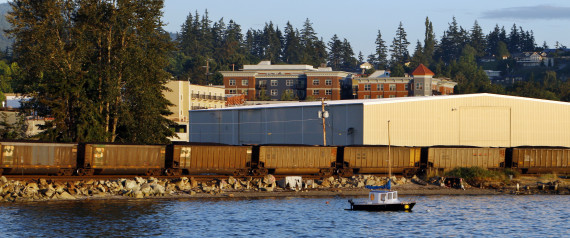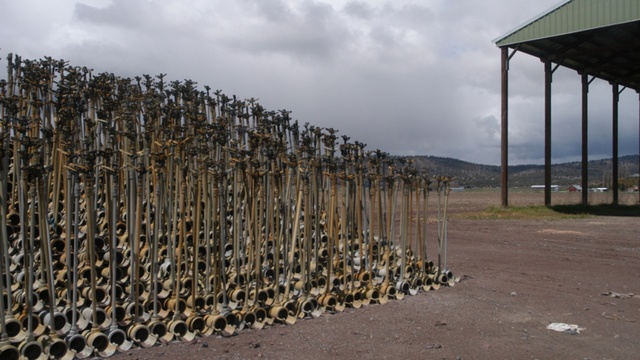
By: Lynne Peeples, Huffington Post
Doctors, tribal leaders, business owners and concerned parents are among those cheering a potentially major blow to Big Coal.
On Monday, an Oregon state agency announced its rejection of a permit for a coal export facility on the Columbia River. The proposed Coyote Island Terminal is one of three remaining projects being pushed by the fossil fuel industry to create a coal export superhighway through the Pacific Northwest. Three previous proposals have already been dropped.
The Oregon Department of State Lands cited disruption to waterways and harm to tribal fisheries among its reasons for the refusal, which makes future approval of the port unlikely but still possible if the company pursuing the project files a convincing appeal.
Tom Wood, owner of the Rivertap Restaurant and Pub in The Dalles, Oregon, called the news a “landmark victory for our community, as well as communities across the nation.”
About three years ago, Wood and his son, Aiden, then 9, were salmon fishing on the Columbia River. As they returned to their car, Aiden spotted small clumps of coal near some railroad tracks.
“We brought a pile home and lit them on fire,” Wood recalled. “You know, the fun things you do with coal.”
He soon realized that the coal likely came from the open rail cars that shuttle along the Columbia River to Canadian ports. That recognition helped push him to join with thousands of others across state, economic and political lines who have tried to thwart the proposed increase in the number of these coal trains rolling through the region. The mile-plus-long trains originate at mines in the Powder River Basin of Wyoming and Montana and head west to meet up with Asia-bound ships. Opponents, who have been protesting and signing petitions for a few years now, worry that more coal trains could ultimately lead to problems ranging from local traffic delays and health harms due to air pollution, to faster climate change as a result of more coal-burning overseas.
Proponents of the coal ports, meanwhile, contend that greater exports mean needed jobs and tax revenues for struggling Western towns and Native American reservations.
“We do have to balance the health of our community with the need for commerce,” said Wood. But he argued that the former is more critical in the long term, including for his son’s future. Referring to the permit rejection, he said, “The win is a testament to the power and dedication of countless Northwest families to assure that these dirty, dangerous projects don’t take root for short-term gains.”
The U.S. has seen a steady decline in domestic coal use in recent years thanks to tighter federal regulations and the expanded viability of natural gas and renewable energy. But the rise of coal-hungry economies in China, India and other fast-developing nations offers a promising alternative market for coal companies. If government agencies eventually grant approval to all three export terminals proposed for Oregon and Washington, up to 100 million metric tons of the combustible rock per year could soon pass through the Pacific Northwest. The Coyote Island Terminal on the Port of Morrow at Boardman, Oregon, would account for less than 10 million metric tons of that total.
Ambre Energy, the Australian-based company pursuing the project, told The Huffington Post in a statement that it disagrees with Oregon’s “political decision.”
“We are evaluating our next steps and considering the full range of legal and permitting options,” added Liz Fuller, an Ambre Energy spokeswoman.
With the door still open for the Coyote Island Terminal to be approved, as well as for the other two port proposals in Washington state, opponents are voicing somewhat restrained optimism.
“This is a relatively small amount of coal compared to the other proposals,” said KC Golden, senior policy adviser for the nonprofit Climate Solutions. But he added that the formal permit denial is still a “very big deal.”
“It’s a terrific affirmation of what, in some ways, ought to be obvious,” said Golden. “This is a profoundly bad idea for the Northwest and for the world.”
Among the most vocal opponents have been Native American tribes whose reservations lie in the coal trains’ path.
“Yakama Nation will not rest until the entire regional threat posed by the coal industry to our ancestral lands and waters is eradicated,” JoDe Goudy, the Yakama tribal council chairman, said in a statement Monday night.
On Sunday, the Lummi Nation, whose reservation neighbors one of the proposed ports in Washington state, launched a totem pole journey — a road trip with totem pole in tow — that they hope will consolidate tribal opposition to Big Coal and Big Oil.
“Such decisions are few and far between,” the tribe stated in response to Monday’s announcement. “This is important not just for the Yakama and Umatilla but all Indian fishing tribes. Together we can, and will, protect our way of life.”
Meanwhile, there are other tribes that could benefit from coal exports. As HuffPost reported in January after the Lummi Nation’s first totem pole journey, the Crow Nation of rural Montana argues that it desperately needs to develop its coal reserves to lift its people out of poverty.
Dr. Robert Merchant, a pulmonologist in Billings, Montana, who deals with the health problems related to coal mining near his city, acknowledged the dilemma.
“There are a lot of people that would stand to have substantial gain from the extraction industry,” he said. But he also sees the high public costs associated with the industry.
Montana, Oregon and Washington are among Western states battling forest fires this summer and suffering the resulting poor air quality. Scientists warn that such blazes are becoming more frequent and intense with the changing climate and that coal plays a significant role in this shift.
Then there’s the blowback of toxic pollution from Asia’s coal-fired power plants. “Plumes come right across the Pacific,” Merchant said, noting that they can further contaminate the West’s air and water with toxins such as mercury.
Perhaps of most immediate concern to many opposed are the trains, barges and ships themselves, which block roadways for emergency vehicles, belch diesel fumes and blow coal dust. Diesel exhaust is known to worsen conditions such as asthma and chronic obstructive pulmonary disease, and may even raise the risk of certain cancers. The extent of the threat from heavy-metal-laden coal dust is less clear, although evidence is building.
The public health implications spurred more than 3,000 medical professionals and public health advocates to sign on to letters requesting denial of the Coyote Island Terminal permit. In Oregon alone, 165 physicians voiced their concerns to the governor.
“We are particularly concerned with the health of our most vulnerable populations: prenatal, early childhood, the elderly and those with pre-existing conditions,” they wrote.
Wood and his family live within a half mile of coal train tracks. Trains pass within 300 yards of his restaurant and within 50 feet of a winery he helps operate.
“It’s been a challenging fight,” Wood said, “and it’s far from done.”


